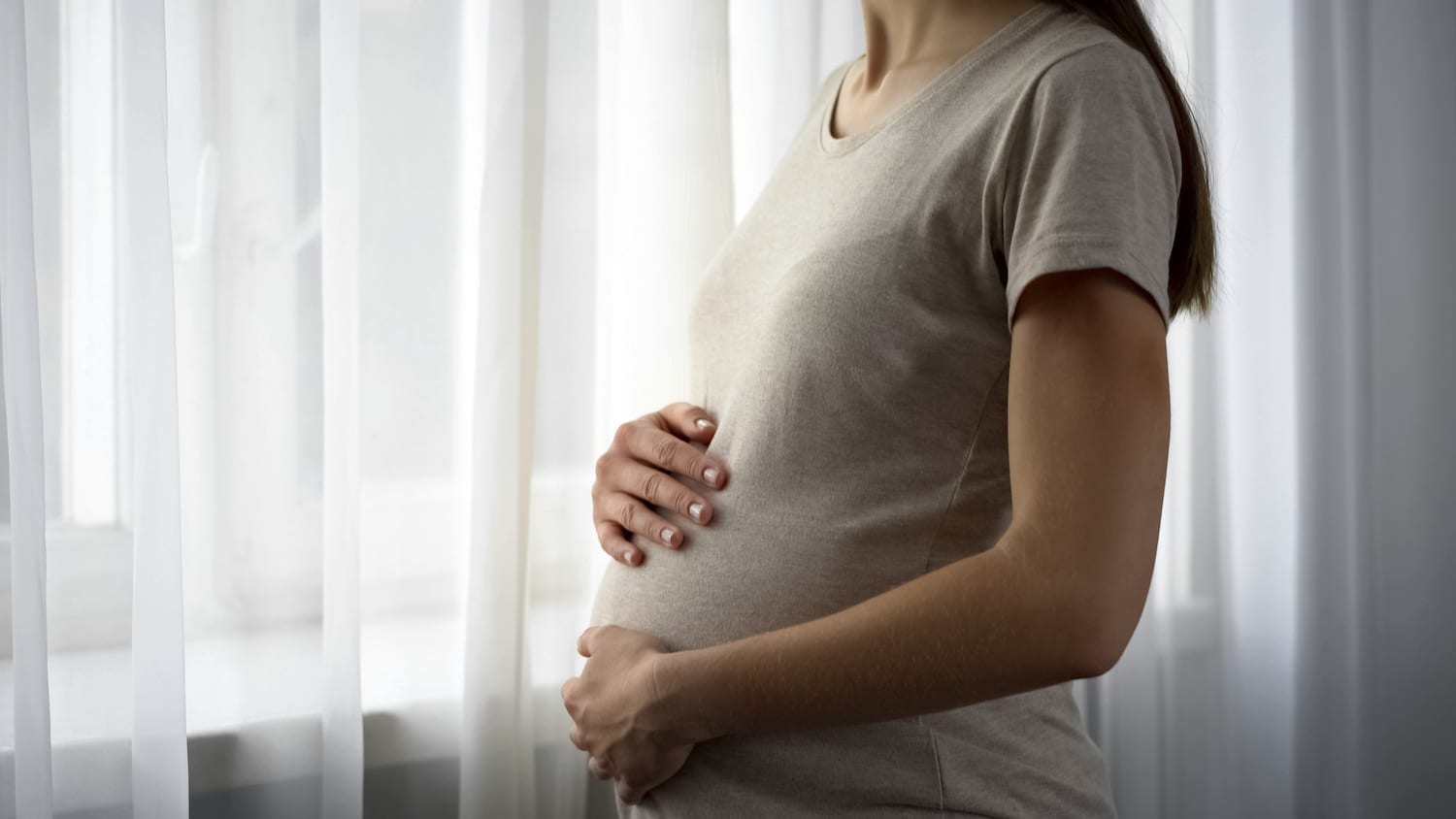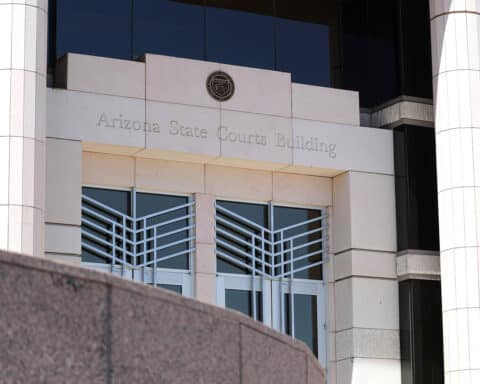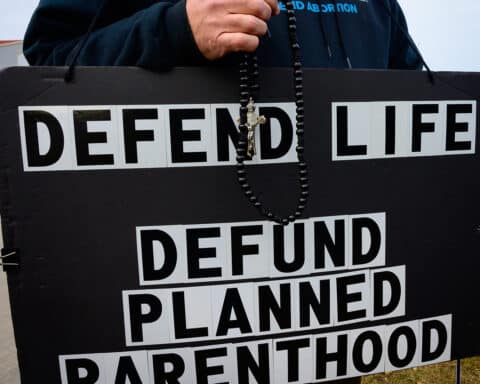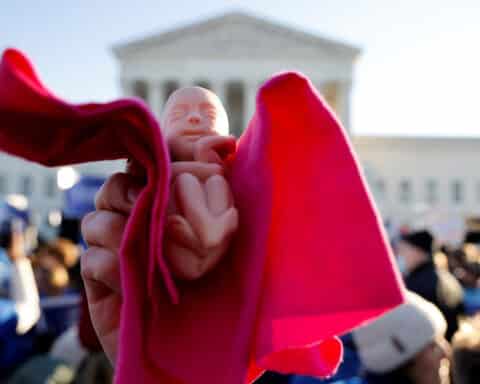Life-affirming pregnancy centers are agreeing with what a new study suggests: Many women are tempted to choose abortion because they feel like they have no other choice.
“The women we serve often believe that abortion is their only choice,” Roland Warren, the president and CEO of Care Net, a non-profit that supports a network of more than 1,200 pregnancy centers, told Our Sunday Visitor. “And the men we serve are often prepared to support whatever decision the woman makes.”
A peer-reviewed study by the Charlotte Lozier Institute (CLI), the research arm of Susan B. Anthony Pro-Life America, recently found that “nearly 70% of abortions are coerced, unwanted, or inconsistent with women’s preferences,” according to a CLI press release.
The study’s release follows the Supreme Court’s decision in Dobbs v. Jackson Women’s Health Organization, which freed states to decide abortion policy nearly a year ago, on June 24, 2022.
The study, published in the medical journal Cureus, drew from a retrospective survey of 1,000 females, ages 41 to 45, living in the United States. Of the 226 women reporting a history of abortion, only 33% identified their abortions as wanted. Another 43% called their abortions accepted but inconsistent with their values and preferences while 24% reported their abortion as unwanted or coerced.
Sixty percent said they would have preferred to give birth if they had received more support or had more financial security.
“This study confirms earlier findings that the hidden epidemic of unwanted abortions is real, and far larger than most people imagine,” the lead author, David Reardon, Ph.D., a CLI associate scholar and director of the Elliot Institute, said in the press release.
“We need to discard the dangerous assumption that ‘freedom of choice’ reflects the reality behind most women’s experiences with abortion,” he added. “Only the minority of abortions are freely chosen absent outside pressures.”
The post-Dobbs landscape
The study’s findings come as states enact pro-life laws. According to Susan B. Anthony Pro-Life America, 25 states have laws to protect unborn babies starting between conception and at 12 weeks of pregnancy. These laws have the potential to save nearly 200,000 lives a year, according to the group’s tracker of pro-life laws following the Dobbs decision.
The national pro-life group identifies 14 states (Alabama, Arkansas, Idaho, Kentucky, Louisiana, Missouri, Mississippi, North Dakota, Oklahoma, South Dakota, Tennessee, Texas, West Virginia and Wisconsin) with nine-month protections for the unborn.
Two states — Nebraska and North Carolina — enforce or will soon enforce protections for the unborn at 12 weeks of pregnancy. Florida currently protects unborn babies after 15 weeks, and could soon protect the unborn after six weeks depending on an ongoing legal challenge. Georgia protects the unborn beginning around six weeks.
The group counts seven states (Arizona, Iowa, Indiana, Ohio, South Carolina, Utah and Wyoming) with strong protections for the unborn in litigation.
These laws include exceptions, the tracker notes, such as to save the life of the mother.
The other 25 states have few or no protections, according to the group.
Kelsey Pritchard, the director of state public affairs at Susan B. Anthony Pro-Life America, noted the “incredible progress.”
“If you think about where we were one year ago, it’s just incredible to think that we now are at the halfway point in the states, with half of the states protecting babies between that time frame, between conception and 12 weeks,” she told Our Sunday Visitor.
At the same time, the court system is considering the future of abortion pills. The FDA first approved mifepristone, which is paired with another drug called misoprostol, for earlier abortions in 2000. Permitted for use up to 10 weeks of gestation, it accounts for more than half of all U.S. abortions.
Pritchard pointed to Wyoming as the first state this year to pass a law that prohibits abortion pills, and noted a number of other states with laws limiting abortion pills, including receiving them by mail, as tracked by CLI.
She also called for a federal gestational minimum protection that would limit abortions nationwide.
“Unfortunately there are a lot of states with bad laws,” she said, pointing to states that allow everything from abortion up until birth to taxpayer-funded abortions. “That’s the reason why we need a federal role on the issue of abortion.”
“It’s very important that people understand that this isn’t a states’ rights issue,” she concluded. “It’s a human rights issue.”
Pregnancy centers respond to study
In the post-Dobbs landscape, as before, pregnancy centers promise to support pregnant women who choose life.
At Care Net, Warren said that the new study’s findings are consistent with what their centers encounter every day while serving hundreds of thousands each year. Pregnancy centers make a difference here, he said.
“[O]nce we are able to offer them compassion, hope and help in their moment of need,” he said, “they see for the first time that there are realistic alternatives available to them and that an army of compassionate people is standing by to help them choose life.”
Janet Durig, the executive director of Capitol Hill Pregnancy Center in Washington, D.C., agreed that the study’s percentages above resemble what she sees at her center. Her center is one of roughly 3,000 pregnancy centers in the U.S. that provide pregnant and parenting women with life-affirming care at little to no cost.
She described the outside pressures that many of their clients face to choose abortion, beginning with young pregnant women who face pressure from their mothers to abort because those mothers had a child at a young age.
Pregnant women can also feel pressure from the baby’s father, she said. They might be socioeconomically challenged and worried financially. Sometimes they’re told a baby would disrupt their lives.
“We have many women who come back to us after they’ve had an abortion and they’re pregnant again — and they have regretted the abortion and then keep that second child,” she added.
For women who feel like abortion is their only choice, Durig recommended that they find a faith-based pregnancy center like Capitol Hill Pregnancy Center to make an informed decision and see the support system available to them if they choose life.
Women need encouragement
In Sacramento, California, Heidi Matzke, the executive director of Alternatives Pregnancy Center, which includes a team of obstetrician-gynecologists, registered nurses and medical assistants, agreed with the findings.
“Most of the women seeking abortion services do so because they’re being forced to have an abortion by [their] parents or [the] father of the baby,” she said. “They move forward with an abortion because they don’t have the financial support and resources needed to make a life decision.”
Andrea Trudden, the vice president of communications and marketing at Heartbeat International, a network supporting thousands of pregnancy centers, stressed that the best alternative to abortion is another person.
“That is why it is so important that pregnancy help organizations exist so that women have a place to turn when they feel overwhelmed by an unexpected pregnancy,” she said.
“So many women share with us that they simply needed someone to give them a bit of encouragement and let them know that though their plans may be shifting, they can still achieve the goals they have for their lives,” she added. “It is very easy for external factors — family, boyfriends, friends — to focus on the negative, but it is the women who ultimately live with the decision for all their lives.”





